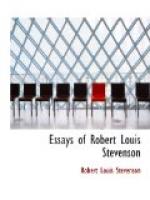And here, with the aptest illustrative force, after I have laid down my part-truth, I must step in with its opposite. For, after all, we are vessels of a very limited content. Not all men can read all books; it is only in a chosen few that any man will find his appointed food; and the fittest lessons are the most palatable, and make themselves welcome to the mind. A writer learns this early, and it is his chief support; he goes on unafraid, laying down the law; and he is sure at heart that most of what he says is demonstrably false, and much of a mingled strain, and some hurtful, and very little good for service; but he is sure besides that when his words fall into the hands of any genuine reader, they will be weighed and winnowed, and only that which suits will be assimilated; and when they fall into the hands of one who cannot intelligently read, they come there quite silent and inarticulate, falling upon deaf ears, and his secret is kept as if he had not written.
NOTES
This article first appeared in the British Weekly for 13 May 1887, forming Stevenson’s contribution to a symposium on this subject by some of the celebrated writers of the day, including Gladstone, Ruskin, Hamerton; and others as widely different as Archdeacon Farrar and Rider Haggard. In the same year (1887) the papers were all collected and published by the Weekly in a volume, with the title Books Which Have Influenced Me. This essay was later included in the complete editions of Stevenson’s Works (Edinburgh ed., Vol. XI, Thistle ed., Vol. XXII).
[Note 1: First published in the British Weekly, May 13, 1887.]
[Note 2: Of the British Weekly.]




